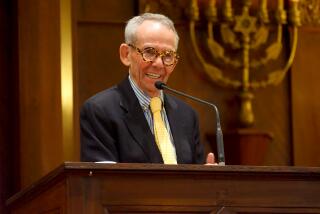NONFICTION : THE PERPETUAL ORGY: FLAUBERT AND MADAME BOVARY by Mario Vargas Llosa; translated by Helen Lane (Farrar, Straus & Giroux: $17.95; 240 pp.).
- Share via
Like Jean-Paul Sartre and Roland Barthes, Mario Vargas Llosa, in this work of literary criticism, sees Flaubert as the first modern novelist. But in his more personal account the Peruvian novelist documents his passionate attachment for the author he considers his spiritual mentor. He discusses Flaubert’s famous narrative impersonality, his meticulous formalism, his obsession with style, and his ambition to raise the lowly novel to a pure art form. In tracing Flaubert’s transformation of lived experience into the fictional world of “Madame Bovary” via language, Vargas Llosa provides a wealth of detail about biographical and literary sources. But most of this information is already available elsewhere.
In fact, the main weakness of “The Perpetual Orgy” is that it lacks originality. It especially lacks the insights on Flaubert’s writing process one would have expected from Vargas Llosa, himself a novelist of considerable linguistic powers. His vague, abstract concepts cover over rather than reveal the intricate mechanisms of fictional transformation, as in the following remarks: “. . . the point of departure of the fictional reality is always real reality such as it is lived by the writer.”
Perhaps the banal quality of such observations comes from “The Perpetual Orgy” being a translation. But in any event, the book is less interesting for the questions it raises about “Madame Bovary” than for the questions it raises about the institution of publishing. Would this book have been published by Farrar, Straus & Giroux if it had not been written by an already celebrated writer?
More to Read
Sign up for our Book Club newsletter
Get the latest news, events and more from the Los Angeles Times Book Club, and help us get L.A. reading and talking.
You may occasionally receive promotional content from the Los Angeles Times.









